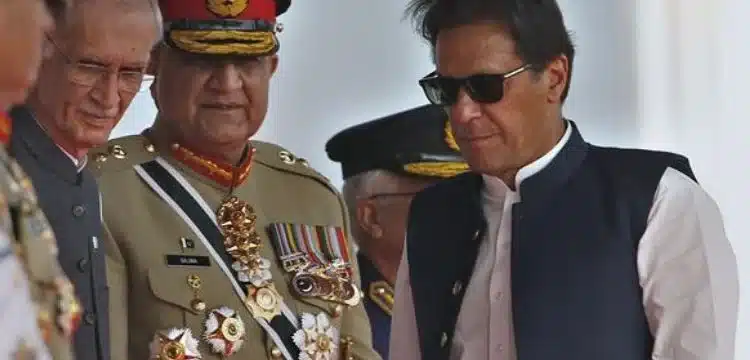[vc_row][vc_column][vc_column_text dp_text_size=”size-4″]In Islamabad, the former Prime Minister Imran Khan, who has recently been sentenced to a 10-year jail term in a cipher case, has levelled serious accusations against former army chief General (retired) Qamar Javed Bajwa, alleging his involvement in the theft of a confidential document from the Prime Minister’s House. Imran Khan made these claims during his statement recorded under Section 342 in the ongoing cipher missing case. According to him, one of his aides had stolen the diplomatic cable from his office at the behest of the former army chief.
This development comes after a special court found Imran Khan and his second-in-line, Shah Mahmood Qureshi, guilty of leaking state secrets in the cipher case, resulting in both of them receiving a 10-year prison sentence. The verdict was delivered by Judge Abu Alhasnaat Zulqurnain at Adiala Jail.
Read more: Legal Representatives Assigned For Imran Khan , Qureshi In Cypher Case
Imran Khan, the founder of the Pakistan Tehreek-e-Insaf (PTI) party, asserted that the cipher was originally housed within the PM House. He further stated that the responsibility for the security of the building lay with the military secretary, principal secretary, and protocol secretary. Khan emphasized that during his three and a half years in office, the missing cipher was the only document that disappeared from the PM House. He claimed that an investigation conducted by the military secretary yielded no leads regarding the missing document.
Making serious allegations against General Bajwa, Imran Khan accused him of employing former Pakistani ambassador Husain Haqqani for lobbying against him. Moreover, Khan asserted that the former army chief had utilized the Inter-Services Intelligence (ISI) to exert pressure on individuals to distance themselves from the PTI. Imran Khan claimed that despite his discussions with Gen Bajwa, the ISI continued to work against his party.
Discussing his visit to Russia, Imran Khan mentioned that both the Ministry of Foreign Affairs and General Bajwa were in agreement with the decision. Regarding a paper waved during a rally at the parade ground, Khan clarified that it contained paraphrased content from the missing cipher. He insisted that during his address, he deliberately refrained from naming any specific country. Khan alleged that the public display of the paper was a strategic move to send a message to Gen Bajwa, indicating that the entire plan would be exposed if the PTI government was toppled.
In summary, Imran Khan’s accusations against General Bajwa and the unfolding events in the cipher case paint a complex picture of political intrigue and power struggles in Pakistan. The former prime minister’s claims suggest a broader conspiracy involving theft, espionage, and foreign influence, with significant implications for the political landscape of the country. As this high-profile case continues to develop, it raises questions about the intersection of politics, security, and the military in Pakistan.[/vc_column_text][/vc_column][/vc_row]











